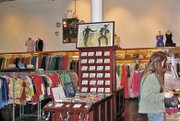Play That Funky Music, Retailer
Creating a soundtrack for strong sales
The music industry’s profits have declined in the past decade, but that doesn’t matter to Mark Werts. In addition to running landmark specialty store American Rag CIE, he executive- produced an album named after his store that is getting airplay on radio stations such as KCRW in Los Angeles. The album is also scheduled to be sold nationwide at the Virgin Megastore in May.
Werts’ jump into the music biz isn’t a vanity project, and he isn’t taking a page from Starbucks Inc., which has successfully sold CDs at its cafeacute;s. He said the collection of up-and-coming electronica is a logical step for his growing company.
“I’m in the emerging trends business,” Werts said. “Electronica is the music of the future.”
American Rag CIE’s 6-by-3-square-foot CD table earns the highest sales per square foot at the lifestyle emporium. There, Werts’ compilation shares space with other electronica, house and soul CDs. The retailer plans another installation of his music series, which he co-executiveproduced with Bruno Guez, president of Los Angeles–based Quango Music Group Inc.
Selling the collection at record stores is a good way to spread the word about American Rag’s name, but the intersection of music and retailing goes beyond branding, according to visual display consultant Brian Dyches, chief executive officer of Atmospheric Group Inc. of Laguna Beach, Calif. He said playing the right sounds can mean the difference between a woman buying a coat and a woman quickly leaving a store.
“What’s the power of unlocking buying potential? It’s putting consumers in a quiet and soothing space,” Dyches explained. “It creates a safe zone that says, ’Yes, I’ll take that.’”
Dyches said music has become as important to store design as architecture. But deducing what sounds will captivate consumers can be as elusive as finding the right notes when crafting a hit pop song.
Dyches recommends playing instrumental music. “Anything lyrical will influence the consumer to think about the lyrics and sing the lyrics. It takes their focus away,” he said.
But lyrical music such as hip-hop also can help make a deal, according to Rick Gillette, vice president of music at DMX Inc. The Los Angeles company provides musical services to airlines, hotels and stores such as Sean John in New York, the flagship store of rap mogul Sean “Puffy” Combs’ fashion label. DMX started doing business in the early 1970s by licensing the work of pop artists specifically for stores. While the company is transitioning out of Chapter 11 bankruptcy, which it declared in February, it is being sold to THP Capstar Inc. of Austin, Texas.
“One size does not fit all,” said Gillette, a former radio programmer. “You have to appeal to a specific market segment. It’s a way of differentiating the brand.”
DMX programs more than 500 musical styles that are custommade for any environment, including chi-chi stores, which are probably perfect for the DMX channel “Chic Boutique.” The company’s goal is to find music that fits specific consumers’ moods, according to Gillette. “When you’re paying $175 for a pair of jeans, you should feel like you’re on a runway,” he said.
But playing music could get retailers in trouble with the law. Radio stations, restaurants and stores must pay fees to artist-licensing organizations such as ASCAP (The American Society of Composers, Authors and Publishers). In 1996, Congress defined rules on playing music in commercial spaces. Those excused from paying fees include establishments playing radio in spaces that are 3,750 square feet or less. But establishments playing CDs and those that are larger than 3,750 square feet must pay licensing fees, which average $650 annually, according to Vincent Candilora, senior vice president of licensing at ASCAP. Businesses can pay fees directly to ASCAP or have fees managed for them by music services such as DMX and Muzak LLC, based in Fort Mill, S.C.
Many feel the business of providing music to stores will grow. Quango has made headlines in the past few years by working with the albums of popular electronica groups such as Zero7 and Koop, but Guez forecasted that 60 percent of his label’s future revenues will come from providing soundtracks to stores and fashion companies.
One of Quango’s first fashion projects will be a music collection compiled for Los Angeles– based Da-Nang Clothing. Guez believes the CDs, scheduled to be in stores in June, will expand the brand experience from the stores to people’s car stereos and nightclub schedules.
This new branding development does not stray too far from one of the central attractions in retail, according to Werts. No matter what he sells—jeans, CDs or food—he said the prominent attraction remains the same. “Retail is entertainment,” noted the lifestyle mogul.






















